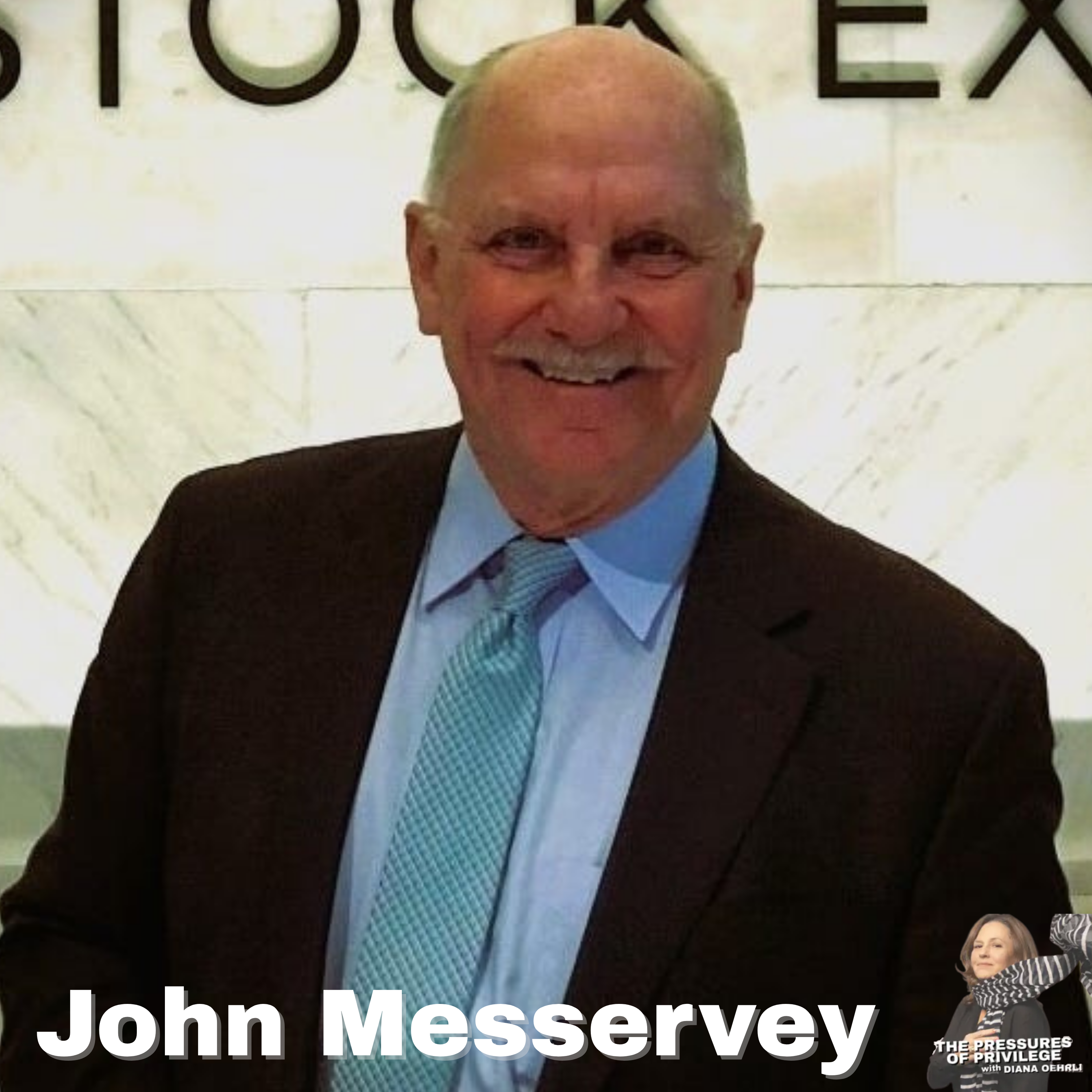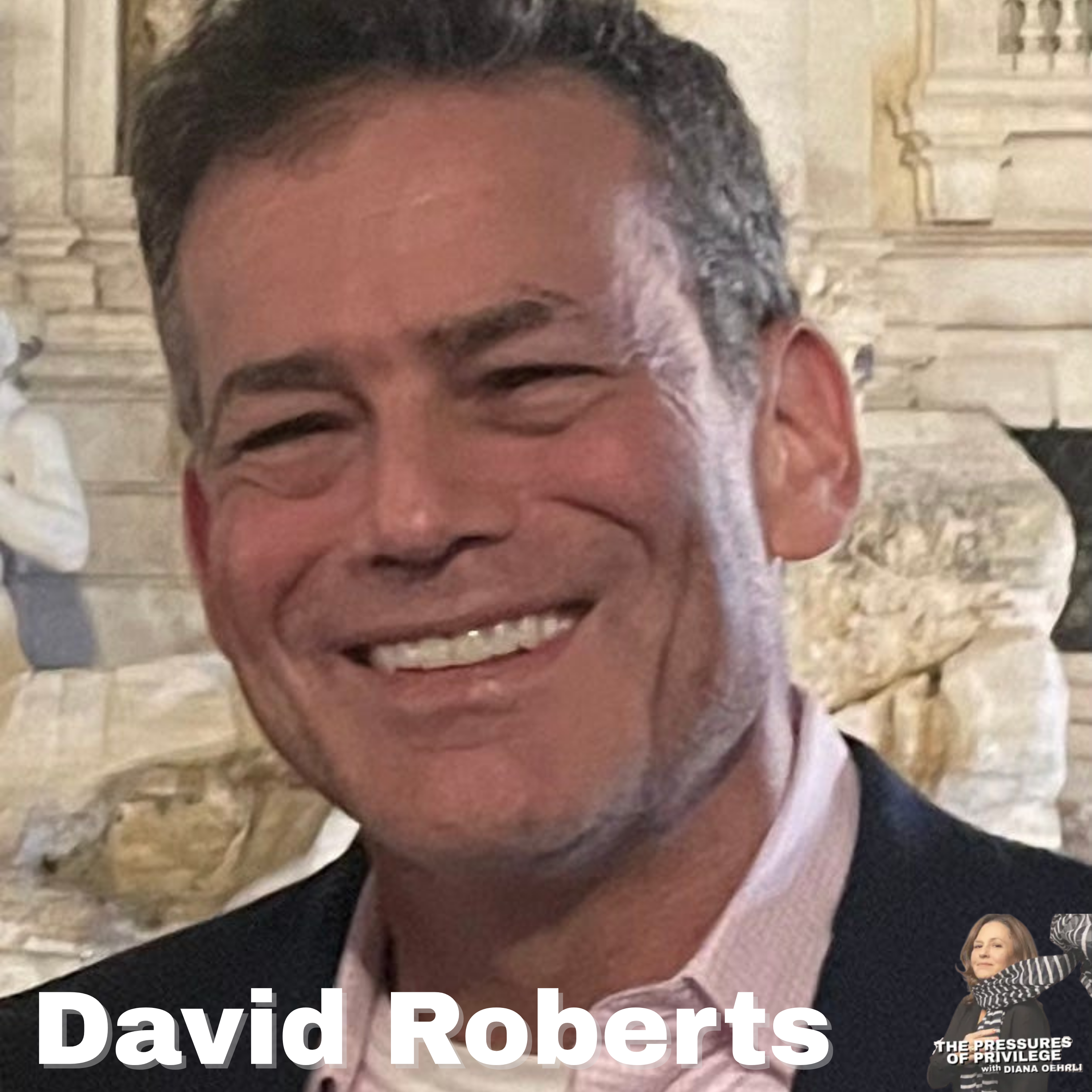Episode Transcript
[00:00:00] Speaker A: What if everything you think you know about wealthy families is wrong?
Today I'm talking with Don Messervy, who's headlining the Newport Global Summit this week. John has spent decades advising more than 460 ultra high net worth families globally and has interviewed 10,000 families.
And what he's learned might shock you. John reveals the real reason family fortunes disappear. And it's not what you think.
He shares the phrase parents say that he believes is the beginning of the end for family wealth. You'll hear about the surprising trend he's seeing between young men and women and why he thinks one gender is completely winning. Right now we dive into his philosophy about relationships that guides everything he does in his work. It's just four words, but it will change how you think about every relationship in your life.
Plus, John shares some simple communication strategies that can transform any difficult conversation.
These aren't just for wealthy families. They work for anyone dealing with family conflict or tough conversations about money.
And wait until you hear what he has to say about the phrase I worked hard so you wouldn't have to.
Whether you have millions or you're just trying to build a better life for your kids, this conversation will give you a completely new perspective on family money and what it really takes to create lasting success.
Let's dive in.
You went from being a workaholic management consultant to finding your passion in family business advising. What was that turning point like for you?
[00:01:41] Speaker B: You know, being a workaholic in your 20s, you're either sleeping in your parents basement watching, watching old movies and video games or you're working hard to kind of do something interesting in your life.
And I, there's a lot of stories I could tell you about that journey there multiple times that woke up. But the turning point came when I had dinner with a client that was telling me about his family.
And I was always concerned about, you know, return on stockholder equity or return, you know, creating revenue streams and wealth and all of that. And, and he was telling me he's a very successful guy, went to Brown University and he's actually Ted Turner's roommate. And Ted doesn't probably remember much about Brown, but the story was about his family. And I thought this is an intriguing idea of having a powerful family system meeting up with a wealth creation system, their family business which had been there for three or four generations. And so I just laser focused on that topic. And at the time there was almost no one in the field other than Leon Danko in Cleveland.
Met up with a few other people, some academicians and Some other people and five, six, seven of us started to do this work back in the 80s, and then it just went from there.
[00:03:01] Speaker A: Wow, you've been doing this a long time.
[00:03:03] Speaker B: Yes. A lot of miles on this body.
I've been in 60 countries and probably 10,000 individual interviews with family members. And I bet I traveled 5, 6 million miles.
[00:03:19] Speaker A: Yeah, I read that. 10,000 interviews. That's unbelievable.
So you really get this topic?
[00:03:26] Speaker B: Well, actually, it's interesting you say that.
I will feel that I do get the topic, but I don't feel like I know everything.
And I treat every client as an n of 1.
Now, there are themes that are absolutely consistent throughout my work, but every client comes in with a whole nother bag of emotions and behaviors and relationships and.
And goals that we work on. And they. There's always a presenting problem. We want to be better at governance or I want to get along with my brother or we're partners are not working out. That's. You start peeling the onion and you start to get to the real issues, the rootedness. And that's my goal. My, you know, this idea of superficial consulting. I don't even call myself a consultant anymore because I really just like being an advisor. What are other families doing in similar situations? What have I seen successfully work as a solution? You decide your motivation. I mean, I have to win two battles. There's a battle for structure and a battle for motivation. If the client is motivated, they. They have to be winning that battle. I set up the structure. We're going to meet. We're going to meet this often. We're going to meet here. You're going to be on time. You're going to be prepared. Here's what I'm going to ask you to read. Here's what I ask you to discuss.
If, if I win the second battle and they win the first, they win both and we have successful outcomes. Not, not unlike therapy, not a therapist, but it is highly therapeutic.
People want someone to relate to their challenges. And being wealthy doesn't mean that your challenges are over.
[00:05:14] Speaker A: Yeah.
So what are some of the challenges that you've seen?
[00:05:20] Speaker B: Well, there's probably hundreds.
Well, top five, Sure. I think, I think for a family business, the challenges are succession, governance, leadership, family harmony and unity and communication.
Those are the first five that on this wonderful morning, roll off my head.
[00:05:45] Speaker A: Wow, you rolled that off so fast. I'm so impressed.
[00:05:49] Speaker B: That's my life.
I want people to be better communicators. It's interesting. I saw this study not long ago that said the issue with communication, the number one issue is tone.
It's if you're talking to your son and it's, damn it, Jimmy, you left the car out of gas again.
That sounds very different than, hey, Jim, you know what?
We got to talk about this.
And when you get home from school, we need to discuss.
You're using the car now.
Jimmy's going to sit there all day and think about, oh, my, I'm not going to be able to use the car. I got a date this weekend or whatever, and what was it? And then he's going to figure out was gas, and he's going to not do it again. You know, so there's a whole piece about communication. It's tone. I have a friend who taught me something years ago. Start.
Start your questions with hmu. Help me understand.
[00:06:48] Speaker A: Hmm, I like that. That's a really good tip.
[00:06:51] Speaker B: So it's a nice, easy way to get into a conversation that might be sticky or difficult. Help. Kind of like help me understand why you feel that way.
And. And then I like I statements, and. We're just talking about communication now, Diana, but I like I statements. I suggest. I propose. I'd like us to consider. I'd like us to think about rather than, you should, you should, or we should. No, no, no. The shoulds will get you.
It's actually very gestalt on the shoulds.
[00:07:21] Speaker A: Yeah, I love that. Oh, my. This is so helpful.
Because I learned that empathy is not agreeing or identifying with somebody and saying, me too. It's really just seeking to understand.
That's true empathy.
[00:07:39] Speaker B: Yes. And I think it's.
Families don't need to agree 100% with each other. That's really important to understand.
You don't need 100% agreement. You just need alignment. You know, we're going in this direction and we have multiple paths, but you don't need to have complete agreement.
[00:08:01] Speaker A: How can families communicate better about money and business?
[00:08:08] Speaker B: Well, in every family, there are secrets. Trouble is, everybody knows a secret.
So we don't need. And I really don't think we need to go through a complete discussion of dad's drinking or mom's affair or whatever it is. I mean, you know, some things, you just need to let that be in the past.
But better communication would be to talk about the unspeakables. And I have clients. I'll borrow from a colleague here, but I have clients. They look at it and they go, well, I can't talk about that. We're never going to talk about that. Boy, we're really never going to talk about that. And pretty soon that piles up. So I will go into a client and their unspeakables sometimes are pretty substantial and everyone knows what they are.
So my job is to kind of put the pin back in the grenade before it goes off and gently but persistently take these items one by one and get to some kind of understanding. Now, how can they do it better? Well, they can do it better by some of the things we just mentioned. Hmus, I shoulds using I statements, etc. But they also be better with a genuine, sincere interest in listening.
And so it's so important that they get their points out. Why don't they understand my brilliance or my greatness or my, my fascination with this idea or my, my, my new product or whatever it is? And in fact, soaking it up, I call it soaking it up. Just listening is a major part of communication. Just listen. People want to be heard. Okay, listen to them.
[00:09:48] Speaker A: I guess my question was really more about the money aspect because money is so taboo in a lot of families and, and they don't like to talk about money. It's sort of a dirty word. So how does one talk about money?
[00:10:00] Speaker B: Well, there's a lot of aspects to money. One is compensation, which can be in a business.
You know, why does, you know, Sarah's kid make all this money running a plant that he hardly shows up for? And why are we keeping him on the payroll? There's that issue, but then there's, what do we do with our wealth?
Then there's money in philanthropy and charity, and then there's money in. We have a private jet money or multiple. I have clients with multiple private jets.
And what are we doing with that?
So I, I think money and our culture is really about wealth. I mean, wealth to me is a state of mind. And, and you can say, okay, I'm, I'm wealthy, so I don't have any problems. I mean, friends ask me. I have wonderful friends that say, John, what is it like to work with some of these families? And, and I would say they get up in the morning and they have a lot of problems to deal with. I mean, they're very smart people. I call them the alpha walls of capitalism. You may have heard that last year at Newport. And, and I, and I, I look at the. They're, they're really good at making money.
What challenges them is their relationships. And really think about it. All business is relationships. So I help them with that. But back to wealth as a state of mind. They get up in the morning. And they have endless meetings with attorneys and accountants and tax people and estate planners and I mean, you think their life is fun? That's not fun. Not for me.
So you know, they have to be responsible stewards for the family wealth and, and then they have to prepare the next generation for that. And, and they've been, and they've been sitting, just waiting. When do we tell the children about the money? Well, let me tell you, with four German cars and European vacations and the yacht and, and the kind of places we hang out in the clubs, they don't need to be told much. They've got that part figured out.
[00:11:51] Speaker A: But some kids know, okay, we're rich, but they, they might think my dad's a billionaire, but Maybe he's only 100 millionaire. I mean, do you think it's wise to let kids know the extent of your net worth?
[00:12:06] Speaker B: That's a great and perennial question.
Now certain financial advisors across the country, I think there's self serving in saying this, to be honest. Tell them everything at 18. I think that's insane. I think that the family knows when the right time is to tell this person and this person and this person. And that is when you've achieved some degree of maturity. As Diana, as an aside, right now the girls are winning. I mean they're much more focused, more planful, more career driven. They're more. We are so ambitious, the men. I mean, it's just completely turned around. We have too many young men sitting in their parents house waiting for, you know, somebody to call and give them a job and well, it just doesn't feel right. Dad, I don't think I'm going to take that job. Well, wait a minute. It's not about feeling right. You need to become economically self sufficient as soon as possible. And so we've got way too many parents. I could go into this at length, but way too many parents that are coddling their children, the wealthy children and, and actually they're basically a crutch for lots of reasons. I mean, one example might be we're going to keep Jake around because you know, dad's always traveling and mom likes Jake a lot and you know, he's, he's kind of the son that, you know, that kind of hangs around mom and takes, takes care of her while the father's out doing whatever he's doing, making money and other things.
[00:13:26] Speaker A: So would that be one of those behavioral barriers for wealth creation that you mentioned in some of your writing?
[00:13:33] Speaker B: I think. Well, first the wealth creation part is the entrepreneur the wealth, continuity part is when it gets tricky.
The entrepreneur, which I've been studying my entire career just for a moment. That's a sidebar on this. Entrepreneurs in the 1980s and before many, not all this is hard to work through subjectively, but many were trying to outdo their father. Or at least not some in a competitive way, but some less so. It was important to, you know, if your father was, you know, a fifty million dollar guy back in those dollars, I'm going to outdo that. And I've had that conversation multiple times with young men and women when, now that all moved to creating wealth as an entrepreneur, Women in family, business, family office, et cetera. Now it's taken on more of a, a technological side, a visit out in Silicon Valley. And the entrepreneurs truly believe they're changing the world.
And that's the new face of entrepreneurship. The other thing, pardon me, going on is that this generation that I, I work with, because by the way, working with the next generation is the number one issue that is presented to me is how do we, how do we teach our kids about the money and how do we deal with them responsible lives?
By the way, Tangent, do not use social media. If you're wealthy, you're, you're, you know, pictures of you with fifteen hundred dollar bottle service at a club in New York is not what the plant worker in Ohio wants to see. And by the way they look.
So leave that aside. I mean, just stay off social media for lots of reasons, including your own personal security.
But back to entrepreneurship and the next generation.
The father, or typically, but not always. I met a lot of wonderful female entrepreneurs.
They move forward because they kind of run the show in the family.
There's two things that they forget. One is there really isn't a model for conflict resolution because there is no conflict because he won't permit it.
So you do it dad's way or you hit the highway. And the second is there really isn't a lot of models about communication because dad is rolling building this company and he doesn't have time for long discussions and you know, therapy and, and you know, soaking it up and listening to your issues, even his wife's issues, they just go and they're, they're, you know, dynamos.
So the next generation has two limitations. One is they don't know much about family communication and they don't know much about resolving family conflict.
And that's the challenge that I see. Then there's always other issues, tangential issues, like the oldest daughter of the entrepreneur. It's a special relationship with their father.
And the other siblings wonder how they can get the same kind of relationship or be in that position.
So all of these aspects, Diana, work toward this great mix of sibling rivalry, even ethnicity, the idea of how people communicate and respect for elders and all of that. And then there's an appreciation because in my view, all inheritance is a gift.
So don't assume you're going to get this. I mean, I think some of the leading people in the Giving Project are starting to get this. Gates is one, Buffett's another. Their children will have enough to make it, but not enough that they can't do anything. That's a twist of phrase that Warren Buffett uses.
[00:17:14] Speaker A: I was part of an investment club up in Boston, and there was a woman in there who said, if you really want to keep your wealth, you've got to look at wealth creation, not just in, you know, whatever your investments are going to generate.
Ever since I've brought wealth creation back with investments, or you said there's either wealth creation or wealth management.
Yeah, continuity. I've actually brought creation back into continuity because I think that attitude is necessary to keep the wealth creation.
[00:17:46] Speaker B: Absolutely. Matter of fact, this is maybe the most important thing we're going to talk about in this podcast is that the ability, not just the ability to create and sustain relationships, which is critical, the ability to build wealth once it's started. And I have a chart that shows the three stages of this. I would go beyond being a steward. I want them to accelerate their wealth. So you're really trying to teach the next generation how to be wealth creators. Your point is absolutely spot on.
[00:18:15] Speaker A: The shirt sleeves, to shirt sleeves pattern. What do you think contributes to that?
[00:18:21] Speaker B: Well, first I should say these succession ratios that they, oh, you know, you're all going to die, you know, by three generations and 70% of them are going to. And then 40, 50%. Look, that sold a lot of consulting, a lot of bad consulting, and sold a lot of term life insurance policies.
I know the study, I know the author. Great guy. But if I see somebody quoting succession ratio failure rates, I know they're very new in the field because they've been totally debunked. Now, shirt sleeves to shirt sleeves is in three generations, is in about 80 languages in the world. And it kind of has this kind of catchy way to look at it. It's got a little bit of motivation in it. It's got a little bit of fear mixed in there. But there's lots of different things that happen.
Not everybody is going to be, as I said earlier, an alpha wolf of capitalism. Not everyone is going to be really, really good at making money. We need doctors, we need dentists, we need plumbers, we need electricians, we need people doing work. And, and so back to this three, you know, three generation fix. I, I think if you don't, where you were a moment ago, if you don't imbue the next generation with a work ethic, then that, yes, that will happen. And I mean a work ethic where you, you have chores, you have things you have to do, you have to be response able, responsible for, you know, your life. You've got to clean your room, you've got to help mom, you've got to, you've got to do this. The problem with so many of the next generation is dad says, I worked hard so you won't have to. Oh my goodness, that's the beginning of the end. Or the, the next generation is I've got to just keep working. You know, in academia, I go to summer camps, I go to computer camps, I go to language school. I do all of these things to build skills. And then when I get done, when I'm out in my 30s, let's say, I don't know what to do.
And part of that is because these people were not problem solvers. I go and talk to educators about this in their schools. You have got to create problem solvers because there are three things you're supposed to do in life. Add value, solve problems, and work effectively. And I've talked to young people, they add value. How do I do that? Solve problems? No, no, this group never had problems to solve because dad's attorney or accountant, they've never done a tax form.
They've never studied, you know, an S1. They don't, they don't know how to do this.
And then suddenly they get out in midlife. And I'm, I'm, I'm in the, at the whim of my financial advisors who are charging me fees that I don't even understand.
[00:21:14] Speaker A: Wow, that's so cool. Add value, solve problems. Was there a third or was that.
[00:21:19] Speaker B: It worked effectively.
[00:21:21] Speaker A: Work effectively. Thank you. And what does that mean?
[00:21:25] Speaker B: Well, part of it is just showing up on time.
I mean, I tell young people in family business, you can't come in here at 10 and leave at 3. I had a friend in our neighborhood up here in Lake Forest, he had a Ford Taurus that he drove to work and he only drove the Ferrari on the weekends. And he would kind of disguise himself Doing so, I mean, being showy with your wealth is a huge issue in our culture. There was an article I read, very popular article a few years ago, when did it always become just about the money?
And so many people are trying now to. Well, we've got, you know, there's this thing with some of my clients. Well, my father won't let me get a private jet. Oh my goodness, you know, if that's the biggest problem you have, or we can't get into this such and such club or I've had people spend inordinate sums, outrageous sums to get into a golf club.
So you know how you spend your money, how you invest it, how you spend your time. This time, among my wealthy, ultra high net worth clients, time is much more valuable than money. Some of my elderly clients call it qtr. Quality time remaining. Don't waste time, their time.
So you've got to get to the point and get there quickly. Yeah.
[00:22:45] Speaker A: So what would you say to a dad whose kid doesn't want to go to college and is just working a restaurant job but paying his own bills?
[00:22:53] Speaker B: Well, I would say, I would say be great at working in your western restaurant job. I'd say be great, serve people.
You know, part of this thing I mentioned earlier about young men and women these days, women mature faster. We now know that psychologically, physiologically, etc. The data is clear.
Some young men take till 25 before they fully emerge, fully developed. I mean, to be honest, and I put myself in this group, young boys can do a lot of stupid things. And I've done them, maybe I've done most of them. And you know, so, you know, you make a lot of mistakes in your 20s, but it certainly does come back to make you a better man later.
For young ladies and women, they don't make nearly, I don't think they make nearly as many mistakes.
[00:23:43] Speaker A: Yeah, I think you do well.
[00:23:45] Speaker B: Okay, well good. We're all together on this. We're human. Yeah.
[00:23:48] Speaker A: We're just maybe better at hiding them.
[00:23:51] Speaker B: Oh yeah, yeah, yeah, that's, that's a great one.
[00:23:57] Speaker A: But I really like that the add value, solve problems, work effectively.
Wow, I really, really love that. I think that's a really good takeaway.
You say that relationships, all relationships are fragile.
What do you mean by that?
[00:24:15] Speaker B: When you're in a family, relationships are assumed, they're assigned. You don't get to pick your family.
And sadly some family members think that they can say anything at any time about anybody and get away with it.
And, and that's a Huge mistake. I mean, they treat. I've seen family members treat each other and say words that they should have never said that can't be taken back. They're kind of etched in granite that say those things and the relationship understandably will end. I see people say things to their family members they wouldn't say to their friends. They wouldn't say to a clerk in a grocery store. They wouldn't say those things. But somehow, because he's my nephew or my uncle or my brother or my sister, I can get away with that. No, you can't.
You cannot get away with that. It's unacceptable. And you have to have communication boundaries around that. So, I mean, I've gone into some of the greatest family fights possible. I've mediated some real good ones. And they start, you know, they start with just a little spark and then it just. It just grows and then they really get going.
That's unnecessary and tragic.
[00:25:33] Speaker A: So that's very sad.
[00:25:35] Speaker B: Yeah.
[00:25:37] Speaker A: How do you help families find alignment, harmony and unity?
[00:25:43] Speaker B: That's the goal is alignment, harmony and unity and getting them to assemble around that goal. Understand, that goal requires that everybody, Everybody participate. Everybody is systemically in a family contributing to the issues at hand.
So at least you've got to take 10% of this as your issue.
At least you've got to take a third of it, perhaps as your motivation. You've got to want to do this and then you lower the temperature by coming to some little understandings. And I mean that very clearly.
You can't go in as a. Say, some consultants in this field, I can't understand this, but they give people a list, a top 10 list of things to do, you know, write me, here's the bill, write me a check and put the. And they're not going to do that.
The difference why I'm still doing this is I truly love it. I walk the client together. We're together on this. I don't tell them what they should do. And here's, you know, a written outline of all the things you've got to do. I mean, I have done that to clarify issues, but not. I don't plan this leaving them. I stay with. I've had clients for. Every month for 15 years, and they still send me nice notes at holiday time. The point is that you've got to carry them through this together.
And they're scared. I mean, to be honest, a lot of them are scared. By the way, for an advisor, they've got to like you, they've got to respect you, and They've got to trust you.
If you take on a client and you don't like them or they don't like you, don't take it. I mean, it's never going to work. It's like your financial advisor, your attorney, your. Any professional advisor, your doctor.
If you don't like them, you're not going to have good outcomes.
So you move from, like, to respect to trust.
So they respect that you know something about what you're doing. And then finally they trust you. And when they really trust you, they'll say something and they'll answer the question I was going to ask a moment ago, which is, what are you afraid of?
Well, I'm afraid my brother will never speak to me again.
Well, he's not speaking to you now, so take a chance. I mean, just take a chance. Call them up. By the way, when you have that conversation, don't go back into the basement of the gutter of all the bad conversations. And you shoulds, and you did, and all that. Talk about anything other than that.
Talk about baseball, talk about.
Don't talk about politics or religion.
[00:28:18] Speaker A: I was going to talk to you about the Cubs. I was born in Chicago, so that should be my team, too.
[00:28:23] Speaker B: Yeah. You know, yeah, I did go to Cleveland that night, and I was blessed to watch them win the World Series in Cleveland.
[00:28:32] Speaker A: Oh, yes, yes, yes. I didn't mean to divert you there, but.
[00:28:36] Speaker B: No, that's okay.
[00:28:38] Speaker A: So talk to your brother about sports and things that are.
[00:28:42] Speaker B: Well, just don't go back into the mess. I mean, if you're not talking, if you have a cutoff when you resume, don't resume on that topic. You'll get there. But, you know, there's a lot of wonderful phrases that we can use to open up a respectful dialogue. And if you learn those, and I hope to teach those to some people.
[00:29:07] Speaker A: Oh, can you give us an example of one?
[00:29:10] Speaker B: Well, you know, in a way, I have. You know, I suggest, I propose use I statements or help me understand. But, you know, you could say, you know, Todd, we're not on the same page with that. And I get that. And, you know, we may never be on the same page, but I respect your point of view. I mean, what do people want? They want respect. I mean, to be honest, that that one word. Maritha Franklin, R A S P E, C T. If you get respect in your family, things immediately get better immediately.
And offering people respect, even if you don't agree with them, is a good starting point.
[00:29:55] Speaker A: I love that you read 70 sources every week. And that's just unreal.
[00:29:59] Speaker B: I read about all kinds of things. I mean, I have this ADHD mind that, oh, you know, it's, I gotta read this and there's a squirrel. I'll read about squirrels and then I'll read about, I mean, I'm reading economics, forecasts, I'm reading books on, on art, I'm reading books on wealth. I'm reading articles on foreign policy. I mean, I, you know, conflict resolution, I mean, negotiation. Concerned about, I'm highly concerned about education in the country.
You know, I have an interest in national security.
[00:30:33] Speaker A: You've mentioned a few trends like, you know, how women or girls are somehow doing better than boys. What are some other trends that you're seeing right now in families?
[00:30:43] Speaker B: Well, I could give you several. Let's start with the next generation. Especially those in their 20s, are not going to sit in a cubicle for 40 years and work for somebody.
There's a get rich quick aspect, particularly around men. They're engaged in bitcoin and blockchain and sports betting and other betting and they, they like or playing the market, you know, shorting this and doing whatever they want to. There's a get rich quick piece because they've looked ahead and said, you know, 40 years in a cubicle with two or three weeks of vacation here is not my life.
So there's that part. There's a whole new wave of entrepreneurship. That's, that's one trend. Another trend that I think is going on is everyone is trying to get their arms around AI and what that means. And to be honest, I've read dozens of articles about AI and I'm still having trouble understanding the impact that it's going to have. Are we going to gain jobs, lose jobs? We're going to put people out of business? I mean, some people are clearly going to be affected. A third trend that worries me is the decline of a middle class in America. That the economic frustrations that they must feel that college education, a better home over time, has suddenly gotten frozen in the markets. And I don't think you can have a great society having a vibrant middle class. I'm a middle class kid, so I get that. I also think in terms of other trends, the wealthy have really coalesced at the top and they all know each other. And although they're competitive, the way they are moving financial interests, including deals, acquisitions, M and A, et cetera, is spectacular. I mean, their investment, the skill is beyond just making money. The skill is knowing the right people that you trust that you're just you're on the flywheel of creating amazing amounts of wealth.
There's politically, economically and socially. We could talk about this for many hours, but there is going to be a reckoning for that at some point. And yet I don't have any problem with people being like Elon Musk and others being billionaires and maybe at some point trillionaires, but they're not. He's not going to take it with him to Mars.
[00:32:58] Speaker A: You were talking about the middle class. I think the millionaires are the new middle class.
[00:33:04] Speaker B: Oh, I just saw a statistic. We minted hundreds of thousands of millionaires last year in America.
What bothers me most is the outrageous inflation in education.
There are far more efficient ways to educate people than bricks and mortar. Now, I'm very mindful that having a young a man or woman go to college for four years fulfills an often not discussed aspect of life, which is the separation they need to have from their parents and emerging. God bless colleges and universities that do a good job of creating that separation in that space because they can launch out and have their occupational talents ready. On the other hand, you could have Austan Goolsbee, the chief economist, great economist out of University of Chicago. You could have his 1212 lectures which our daughter listened to. You could have his 12 lectures piped into almost any economics department in the country and others other Nobel prize winning economists as well.
Why are we duplicating that with, and I'm going to pick randomly, but some economics professor at Bemidji State trying to do the same thing. Now there is the personal interaction.
[00:34:23] Speaker A: Well, we had some technical difficulties with Cox Internet right at the end there, just before we lost connection, we were diving into how John helps families through his different services.
He does a lot of mediation work. And here's something that really stood out to me. He says the biggest drain on family wealth isn't taxes. It's those family fights that lead to expensive legal battles. He's seen families spend millions on litigation that could have been resolved through mediation.
We also talked about communication styles in families.
You know, the founder, the person who built the wealth, often expects their kids to be to communicate and think exactly like them. That's not realistic or healthy. Some people are natural directors, others are presenters who love to talk. Some are strategists who think quietly and others are mediators who want everyone to get along. John helps families understand these different styles so they can work together and better. John also shared his perspective that wealth doesn't create problems, it just just makes existing problems bigger.
We touched on that troubling trend of young adults staying home instead of becoming independent and doing something meaningful with their lives.
John gave us a preview of his talk at the Newport Global Summit this week. It sounds amazing. He's prepared 48 questions and the audience gets to pick which ones they want him to answer.
If you want to learn more about John's work or need help with family business issues, you can find him at ww.privatefamilyadvisor.com thanks for listening and I hope you got as much value from this conversation as I did. His insights about family relationships, communication and wealth really got me thinking differently about what it takes to build lasting family success. Before we wrap up, I'd like to thank Oliver Kiker for the jingle and Gwendolyn Christian for the backup support.
Also, a quick reminder, these interviews are not a substitute for professional medical, legal or psychological advice.
Always consult with a qualified professional for any major decisions in your life.
And thanks for joining me and exploring the connections that make us human and learning insights and strategies to help us build, heal and nurture relationships, including and especially the the one with yourself. It's been an honor to share this time with you and to bring you conversations with some of the brightest minds who deserve more recognition. Remember, life's too short to take too seriously, so don't forget to hit that subscribe button, get outside and let's continue this journey of life together.
See you next time.
[00:37:10] Speaker B: It.






